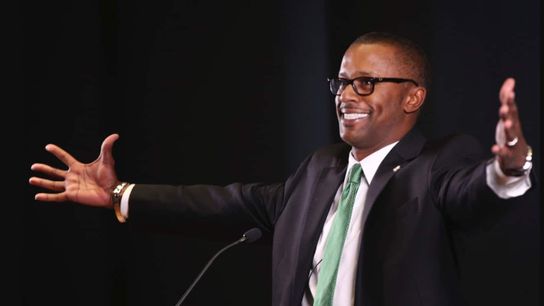On the eve of his opening game at Florida State, Willie Taggart penned a personal essay for The Players' Tribune. Much of it is what you've heard before. Taggart grew up a Noles fan in a Noles family in metro Tampa in the late 1980's. He wasn't recruited to play at Florida State, so instead played for Jack Harbaugh at Western Kentucky, where he developed from a boy to a man and a player to a coach. His coaching travels brought him back to his alma mater, then back home to South Florida, and then to Oregon.
One year in, Taggart was surprised by how much he loved the Oregon job, and it was then that God's sense of humor showed itself: his dream job presented itself at the worst possible time. Taggart knew how bad it would look to leave Oregon after one year but, at the urging of his 16-year-old son, Taggart followed his heart and left for Tallahassee.
He inherited a program that had Top 5 potential but hadn't played that way. After winning the 2013 national championship, Florida State slipped to 13-1 in 2014, then to 10-3 in 2015, to 10-3 again in 2016 and then to 7-6 last season. The whole of the Seminoles that took the field in the 2017 season was less than the sum of their parts, and Taggart recognized why, as he writes below:
Not long after arriving at FSU, I brought the players together in small groups with myself so they could share their backgrounds. The point of these conversations wasn’t to talk about stats or accomplishments. I just wanted everyone to be able to express what they went through in order to get to where they were sitting.
I did this because it became clear to me not long after I got here that this program didn’t have a talent issue. Sure, we have a lot of young players who need more experience, but there’s no question the talent is in the building.
But from watching this team play games from afar, what I felt was missing was that sense of brotherhood that exists within winning programs, that bond that shows through when players are playing for one another rather than themselves. Our players might have been on the same team, but it struck me that they weren’t as close as I’d like them to be away from the field. It didn’t seem like they were spending extra time at the facility after practice or generally hanging out with each other. That was a problem because the most effective person to hold a player accountable for his performance is another player. But to get to the place where players do that, first they need to know each other, so accountability isn’t interpreted as criticism.
So that’s why I had the players gather together to share where they’re from as well as their trials and tribulations. I did the same with my coaches, some of whom I’d never worked with before. Each session, I started off by telling my story, the good of course, but especially the bad. I grew up in a neighborhood where there were a lot of drugs and plenty of crime. I had close friends who ended up in prison as a result of making a couple of bad choices. There are kids who play for me who came from much worse conditions, and some who came from much better, but what I’ve found is that by opening up a bit, they all feel more comfortable sharing a little more of themselves.
Taggart is one of the proven turnaround artists in college football. He inherited an 0-12 WKU program and had the Hilltoppers at 7-5 by Year 2. His four years at USF saw the Bulls go from 2-10 to 10-2. His one year at Oregon saw the Ducks jump by three wins.
Florida State has that same potential, starting with what should be a raucous opener, playing under the lights and in their black uniforms Monday night against Virginia Tech. And if another Taggart Turnaround happens in Tallahassee, you'll know where it started.
